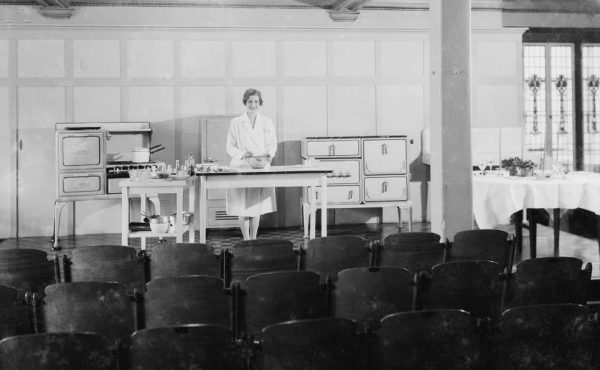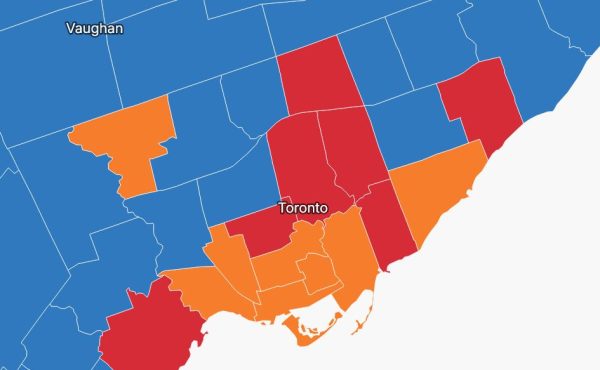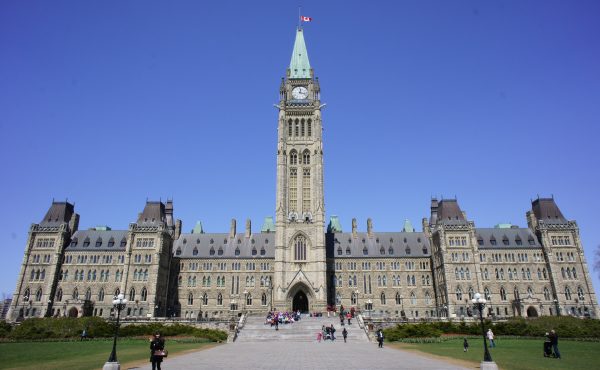
Spacing’s editor Dale Duncan wrote a great piece in this week’s Eye Weekly that discusses the possibility of political parties at the municipal level. Dale has written about this before and Spacing held a poll on the subject on February 1st (26% want party politics while 51% disagree). A brief teaser…
Councillor Karen Stintz, who believes parties would hold councillors more accountable and give those in opposition a stronger voice, foresees the city moving toward some sort of party system as early as the next municipal election in 2010. Councillor Michael Walker, who decries party politics at city hall, says it may be coming whether we like it or not. “It’s terrible, but I think it’s inevitable,†he said back in December. This phenomenon is something John Barber of The Globe and Mail has discussed in his column and Philip Preville wrote about in Toronto Life recently. The idea has some buzz, at least in the press gallery.
Such thoughts are brewing outside of city hall, too. Take the October 2006 launch of The Toronto Party, which hopes to run candidates in each of the city’s 44 wards in the next election, regardless of whether or not Queen’s Park, which holds the power to change the rules, tweaks legislation.
So would we be better off if it brought party politics to city hall? Toronto will have the opportunity to push for electoral reforms with a two-year review of the City of Toronto Act next year. But a move towards party politics isn’t as simple as merely convincing the province to allow parties to exist. Digging into the pros and cons of the role that official parties could play means delving into a seemingly never-ending set of possibilities for the different ways a party system could work.
Personally, I believe party politics at City Hall will bring and end to any kind of pragmatic decision making and co-operation amongst councillors, while at the same time turning Toronto’s city council into a place to implement provincial and federal platforms without regard to local concerns. These concerns seem to be shared by Councillor Adam Vaughan who framed the situation aptly:
Vaughan, who took the city by surprise when he beat Helen Kennedy and the NDP machine that backed her to win his Trinity-Spadina seat in 2006, says that under a party system, constituents would lose out. “If you become part of a political machine that has caucus power and committee power at city hall, you can advocate behind closed doors for your constituents, but at the end of the day, on the floor of city council, you cannot undermine your party because if you do, they’ll de-nominate you and toss you out the door for the next election,†he says. “Take user fees for rec centres. If your party was advocating for this, suddenly you’d be held prisoner to that ideology.â€
Vaughan says some of the current problems with our electoral system, such as the incumbency factor, could be dealt with through different reforms. “If we had more politicians and smaller wards, we’d be even more vulnerable to local concerns,†he says. “We couldn’t ignore a third of the ward and get elected by two-thirds or the ward. Those days would be over.â€
graphic courtesy of Eye Weekly




11 comments
Vaughan’s comment makes no sense. Independent MPs and MPPs are, and can be, elected and re-elected. Several politicians make reputations for being rogues to the party line and favouring their constituents over the orders of their party bosses; and they don’t disappear after the election. In fact, if you feel that your re-election is at stake, and your party is wrong: the only sensible thing to do (wait… do we elect sensible politicians in Toronto?) is to walk from the party; and then join another party, or sit as an indepent. Independents can be elected in a party system.
What a party system does do is make politicians much more honest and accountable with regards to who they are speaking to, and how they are likely to vote on a given issue. It would be useful to know who is caucussing behind closed doors, who is donating to multiple campaigns, and how a given candidate for election or councillor is likely to vote on any given issue. A party system gives us those accountabilities.
For example: we can expect a conservative candidate to be pro-private development; we can expect an NDP candidate to be pro-accessible community programs in the budget. However, there is no way to discern what the agenda of a new given candidate on the ballot is going be when they are on your doorstep when they won’t actively show their affiliation. Is it really a puzzle why voter participation rates are so low at the municipal level, and the most useful thing for election is incumbency or name recognition?
Party politics are deemed appropriate and useful to voters in the 6 Canadian provinces with populations smaller than Toronto. They are also viewed as appropriate and useful in Vancouver, and cities across the United States in Europe. Why is Toronto so special that we feel we can keep going with out it? We’re not a hamlet or a neighbourhood–we’re a city of several million, with only so many representatives to go around.
I can only deduce that an argument that a lack of party system allows the likes of ‘shrewd’ ‘accountable’ politicians like Denzil Minnan-Wong and Rob Ford to really shine at their political best, and work hard to craft pragmatic solutions for their constituents with other caring polticos from across the city stems from obstinate and willful ignorance of the facts as to what the current system is actually producing.
Then there is the reality that unless a party system is introduced, our 40+ independent councillors are going to be so slow and plodding at producing useful legislation and responsible budgets, that a ‘strong-mayor’ system will have to be introduced in order to get things done. Producing the budget will belong entirely to the mayor and his hand-selected cabinet. At that point, you can have all the independent unaffiliated councillors you want, because they’re going to do nothing but make a whole lot of racket, while government of the city is reduced to fewer and fewer elected and empowered officials around the mayor, who will be further and further away from the citizens to whom ideally a democratic system should be accountable.
Enough with this nostalgia and fantasy as to how politics in little villages and utopian dream designs might work: lets strive for an accountable and pragmatic design that tries to get things done, and genuinely empowers the voter.
Richard.
Those party hats could be confused as dunce caps. Either of which is slightly suitable.
I disagree with the above comment by Richard, but do not have the time to debate it other than saying: party politics at city hall will not work simply because of the way council functions. Its not a parliament.
And look what happens in europe — municipal elections are often used to reward and punish higher levels of government. I do not want the decisions made by the province and the feds to be the deciding factor on who represents me at city hall. There is already enough of a disconnect between residents and city hall — having them make decisions on councillors based on what other politicians decide is worth policy worries me to no end.
Respecting that Ben has said he doesn’t have the time to debate this, but regarding his first point, unless he is advocating a strong mayor system (than what is already in place), saying that Toronto City council isn’t a parliament and therefore the party system won’t work is playing semantics. The party system functions just fine in many government bodies that don’t call themselves parliaments, and operate under different rules than the Canadian (or English) legislatures.
It also seems to me that the second argument is assuming, first, that the parties that would form in Toronto would want to affiliate with federal or provincial parties (Saskatchewan, BC and Quebec all leap to mind as provinces whose party systems are unaffiliated with the federal party system), and that policy generated in the provincial or federal arena has no bearing on the municipal situation (Whereas I propose it would have been very useful and conducive to intelligent policy development at the Provincial level if the “conservative caucus” of Toronto understood their complacency would cost them their re-election, if they didn’t speak out against the cabinet schemes of the Harris-Eves regimes for Toronto. Similarly, it might have been useful to have the inside pressure of a known “conservative caucus” on council when it came to whether or not cities would get a cut of the GST.)
Second, the argument assumes that voters aren’t smart enough to distinguish between politicians at different levels of government–and strangely suggests the best way to protect the voters is to make the party affiliations at the municipal level secret, and difficult to decipher: which seems to me to be a solution that only compounds the initial problem. The reality is party affiliations already exist for the overwhelming majority of councillors–the current system just pretends it doesn’t, so, in my opinion helps diminish honesty and accountability within the system. And, for the few effective councillors who truly are independent, why shouldn’t they be able to openly run as such, and thus distinguish themselves from their (presently, secretly) partisan colleagues, if that’s what the voters want?
Richard
How does on reconcile the notion of not having political parties now when in the same article it mentioned that Adam Vaughan had to “beat Helen Kennedy and the NDP machine”?
Currently there is really just a one party system. That of the NDP. The rest are unorganized. When is the last time the left (aka NDP) fielded more than one mayoralty candidate?
I would argue that there is more than one party working at city hall. The Liberals have tonnes of ties to councillors and often share lists at election time. Having seen the inside of three campaigns during the 2006 election of vastly different political stripes, I can say that the NDP is not the only ones working at the municipal level.
The Tories do it too but that’s mostly in the inner ‘burbs since they have little foothold south of St Clair.
And to answer Glen’s question: 2003 (Hall and Miller, tho Hall got tonnes of Liberal support)
The way I see it, a political system should be based upon two principles: 1. choosing your representative to vote on your behalf in a legislature/council based upon their platform and other factors of your own personal choice, and 2. knowing who to hold responsible if you’re unhappy with the way things are done. The current system works fine for the first principle, but fails almost completely when it comes to the second one. As every elected official is their own personal party, there is no group or individual to hold responsible. Not even the mayor can be blamed for errors as he holds approximately the same amount of power as each elected official.
That said, the whole question of “party system or no party system” is far too basic even though it is where we must begin. We must remember that the debate is not “current non-party council system vs. “British party-based parliamentary system”, as we can say with almost complete certainty that a party-based Toronto council would never resemble Parliament in form, starting with the simple fact that the mayor is elected independently and is not the leader of the largest party.
There are many forms party politics in Toronto could take. One could be to simply allow candidates to officially run on “tickets”, informal parties that would require the formation of a coordinated city-wide policy platform and increase accountability, but have no legal sway once people were elected (no party discipline). Almost any other changes would require a change to the laws governing the running of council.
But yeah… how about some debate about the forms of party politics that could be appropriate. There’s no need to assume that party politics would turn council into the House of Commons.
Matt I’m with you. Party politics, officially, just brings another thing to bicker about and no improvement in government that I can think of.
I’m mostly with Vaughan – and while we clearly do have murky political boundaries already – we don’t need even more politricks. If we want better accountibility, bring back a two year term. For more voter input, have a decent enumeration. For ensuring some termover, have a 12-year limit.
Matthew,
I respectfully disagree. IMO, Hall was a Liberal candidate and Miller was NDP.
What about changing the electoral system? A little dose of Single Transferable Vote would make Toronto the good, Toronto the better.
as it is now the ndp use municipal politics as a training ground for their provincial and federal support.When it comes to the Liberal party I see them more as outsiders who think they want to jump in but seem to take part when they have revenge in their blood like the fiasco with Adam Vaughan.Adam is actually tied with the NDP more than he will admit, during the election he got to use insiders to help him identify “planted” voters that could be weeded out to make the election more fair.I believe the needs of the ratepayers are already being ignored.Voters don’t care anymore because they know that the NDP will get their way.As Joe Pantalone said on his web site by “begging borrowing or stealing”(toronto star).Pet projects of those in control is all that counts.It’s a big reason that we are in big trouble with this council.
No party politics, maybe even have an ethics department to expell councillors who do work for a party,something like the lobbyist registry.At the very least the voters should have full disclosure about party loyalty.